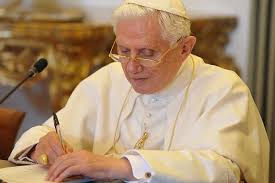BENEDICT XVI
GENERAL AUDIENCE
Paul VI Hall
Wednesday, 7 July 2010
John Duns Scotus
Dear Brothers and Sisters,
This morning, after several Catecheses on various great theologians, I would like to present to you another important figure in the history of theology. He is Blessed John Duns Scotus, who lived at the end of the 13th century. An ancient epitaph on his tombstone sums up the geographical coordinates of his biography: “Scotland bore me, England received me, France taught me, Cologne in Germany holds me”. We cannot disregard this information, partly because we know very little about the life of Duns Scotus. He was probably born in 1266 in a village called, precisely, “Duns”, near Edinburgh.
Attracted by the charism of St Francis of Assisi, he entered the Family of the Friars Minor and was ordained a priest in 1291. He was endowed with a brilliant mind and a tendency for speculation which earned him the traditional title of Doctor subtilis, “Subtle Doctor”. Duns Scotus was oriented to the study of philosophy and theology at the famous Universities of Oxford and of Paris. Having successfully completed his training, he embarked on teaching theology at the Universities of Oxford and Cambridge and then of Paris, beginning by commenting, like all the bachelors of theology of his time, on the Sentences of Peter Lombard. Indeed, Duns Scotus’ main works are the mature fruit of these lessons and take the name of the places where he taught: Ordinatio (called in the past Opus Oxoniense – Oxford), Reportatio Cantabrigiensis (Cambridge), Reportata Parisiensia (Paris). One can add to these at least the Quodlibeta (or Quaestiones quodlibetales), a quite important work consisting of 21 questions on various theological subjects. Duns Scotus distanced himself from Paris, after a serious dispute broke out between King Philip IV the Fair and Pope Boniface VIII, rather than sign a document hostile to the Supreme Pontiff as the King requested of all religious, preferring voluntary exile. Thus he left the country, together with the Franciscan Friars, out of love for the See of Peter.
Dear brothers and sisters, this event invites us to remember how often in the history of the Church believers have met with hostility and even suffered persecution for their fidelity and devotion to Christ, to the Church and to the Pope. We all look with admiration at these Christians who teach us to treasure as a precious good faith in Christ and communion with the Successor of Peter, hence with the universal Church.
However, friendly relations between the King of France and the Successor of Boniface VIII were soon restored and in 1305 Duns Scotus was able to return to Paris to lecture on theology with the title of Magister regens [regent master], now we would say “Professor”. Later his Superiors sent him to Cologne as Professor of the Franciscan Studium of Theology, but he died on 8 November 1308 when he was only 43 years old, leaving nevertheless a consistent opus.
(To continue reading, please see here).

